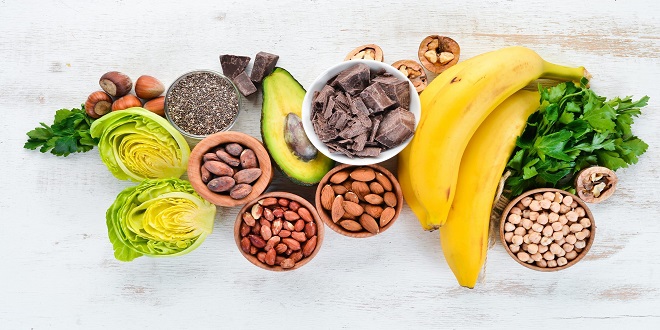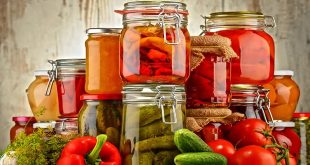Magnesium is an essential mineral that plays a crucial role in many bodily functions, including energy production, nerve function, and muscle contraction. Despite its importance, many people do not consume enough magnesium in their diets, which can lead to various health problems.
Incorporating magnesium-rich foods into your diet can help ensure that you’re meeting your body’s needs. In this article, we will explore the top foods high in magnesium, including vegetarian and vegan sources, as well as factors that can affect magnesium absorption.
By the end of this article, you’ll have a better understanding of how to incorporate magnesium-rich foods into your diet for optimal health.
Top Foods Rich in Magnesium
Here are top 10 foods that are rich in magnesium:
- Spinach
Spinach is a leafy green vegetable and an excellent source of magnesium. Just one cup of cooked spinach provides 157 milligrams of magnesium, which is about 40% of the daily recommended value. Spinach is also rich in other nutrients, such as vitamin A, vitamin C, and iron, making it a healthy addition to any meal.
- Almonds
Almonds are an incredibly nutrient-dense nut and an excellent source of magnesium. One ounce of almonds contains 80 milligrams of magnesium, which is about 20% of the daily recommended value. Almonds are also rich in healthy fats, fiber, and protein, making them a perfect snack or addition to your breakfast.
- Avocado
Avocado is delicious and creamy fruit rich in healthy fats, fiber, and magnesium. One medium avocado provides 58 milligrams of magnesium, which is about 15% of the daily recommended value. Avocado is also rich in other nutrients such as potassium, vitamin C, and vitamin K, making it a healthy addition to your diet.
- Dark Chocolate
Dark chocolate is a delicious treat and a rich source of magnesium. One ounce of dark chocolate with at least 70% cocoa solids contains 64 milligrams of magnesium, which is about 16% of the daily recommended value. Dark chocolate is also rich in antioxidants and has been shown to have several health benefits, such as reducing the risk of heart disease.
- Quinoa
Quinoa is a gluten-free grain and an excellent source of magnesium. One cup of cooked quinoa provides 118 milligrams of magnesium, which is about 30% of the daily recommended value. Quinoa is also rich in other nutrients, such as protein, fiber, and iron, making it a perfect addition to your meals.
- Black Beans
Black beans are a delicious and versatile legume and an excellent source of magnesium. One cup of cooked black beans contains 120 milligrams of magnesium, which is about 30% of the daily recommended value. Black beans are also rich in other nutrients such as protein, fiber, and folate, making them a healthy addition to any meal.
- Pumpkin Seeds
Pumpkin seeds are a nutrient-dense snack and a rich source of magnesium. One ounce of pumpkin seeds contains 150 milligrams of magnesium, which is about 37% of the daily recommended value. Pumpkin seeds are also rich in other nutrients, such as healthy fats, protein, and zinc, making them a healthy addition to your diet.
- Edamame
Edamame is a delicious and healthy snack and a rich source of magnesium. One cup of cooked edamame provides 99 milligrams of magnesium, which is about 25% of the daily recommended value. Edamame is also rich in other nutrients, such as protein, fiber, and vitamin K, making it a healthy addition to your meals.
- Salmon
Salmon is a fatty fish and an excellent source of magnesium. One 3-ounce serving of cooked salmon contains 26 milligrams of magnesium, which is about 7% of the daily recommended value. Salmon is also rich in other nutrients, such as healthy fats, protein, and vitamin D, making it a healthy addition to your diet.
- Banana
Bananas are a delicious and portable snack and a good source of magnesium. One medium-sized banana provides 32 milligrams of magnesium, which is about 8% of the daily recommended value. Bananas are also rich in other nutrients, such as potassium, vitamin C, and fiber, making them a healthy addition to your diet.
Incorporating these foods into your diet can help ensure that you’re getting enough magnesium. However, it’s worth noting that some factors can affect the absorption of magnesium in your body, such as age, medication, and certain health conditions.
Looking for menu prices that are affordable and competitive? Check out Getmenuprice.com
Vegetarian and Vegan Sources of Magnesium
If you’re a vegetarian or vegan, you may be wondering how to get enough magnesium in your diet without consuming meat, which is a good source of this essential mineral. Fortunately, there are plenty of plant-based foods that are high in magnesium, making it easy to meet your daily requirements.
Here are some vegetarian and vegan sources of magnesium:
- Nuts and seeds: Almonds, cashews, peanuts, pumpkin seeds, and sesame seeds are all excellent sources of magnesium. Just a handful of almonds contains around 80 milligrams of magnesium, which is about 20% of the recommended daily intake.
- Legumes: Black beans, kidney beans, lentils, and chickpeas are all rich in magnesium. One cup of cooked black beans contains about 120 milligrams of magnesium, which is 30% of the recommended daily intake.
- Whole grains: Brown rice, quinoa, and whole wheat bread are all good sources of magnesium. One cup of cooked quinoa contains around 118 milligrams of magnesium, which is about 30% of the recommended daily intake.
- Dark leafy greens: Spinach, kale, and Swiss chard are all high in magnesium. One cup of cooked spinach contains around 157 milligrams of magnesium, which is 40% of the recommended daily intake.
- Avocado: In addition to being a good source of healthy fats, avocados are also a good source of magnesium. One medium-sized avocado contains around 58 milligrams of magnesium, which is about 15% of the recommended daily intake.
Incorporating these foods into your diet is an easy way to boost your magnesium intake, especially if you’re a vegetarian or vegan. Try adding nuts and seeds to your breakfast or snack, making a bean salad for lunch, and including dark leafy greens in your dinner.
You can also experiment with different whole grains and incorporate them into your meals throughout the day. With a little creativity, you can easily meet your daily magnesium needs without consuming meat.
Factors That Can Affect Magnesium Absorption
While incorporating magnesium-rich foods into your diet is important, it’s also essential to understand factors that can affect magnesium absorption. Here are some things to consider:
- Alcohol consumption: Alcohol can interfere with the absorption and utilization of magnesium in the body. Heavy alcohol consumption can also lead to magnesium deficiency, as alcohol can increase the excretion of magnesium in the urine.
- Certain medications: Some medications can interfere with magnesium absorption, including diuretics, antibiotics, and some antacids. If you’re taking medication and have concerns about your magnesium levels, talk to your healthcare provider.
- Health conditions: Certain health conditions can affect magnesium absorption, including Crohn’s disease, celiac disease, and kidney disease. People with these conditions may need to take magnesium supplements or work with a healthcare provider to ensure optimal magnesium absorption.
- Calcium intake: High levels of calcium intake can reduce magnesium absorption. While it’s important to consume adequate calcium for bone health, it’s also essential to balance your calcium and magnesium intake.
To ensure optimal magnesium absorption, it’s important to consume a varied diet that includes magnesium-rich foods and to pay attention to factors that can affect magnesium absorption.
If you’re concerned about your magnesium levels, talk to your healthcare provider about testing and potential supplementation. By taking steps to ensure adequate magnesium intake, you can support overall health and well-being.
Conclusion
Magnesium is a vital mineral that plays a crucial role in many bodily functions. Despite its importance, many people do not consume enough magnesium in their diets, which can lead to various health problems. However, incorporating magnesium-rich foods into your diet is a simple and effective way to meet your body’s needs.
In this article, we explored the top foods high in magnesium, including vegetarian and vegan sources, as well as factors that can affect magnesium absorption. By including foods such as nuts and seeds, legumes, whole grains, dark leafy greens, and avocados in your diet, you can easily boost your magnesium intake.
By taking steps to ensure adequate magnesium intake, you can support energy production, nerve function, and muscle contraction, among other bodily functions.






